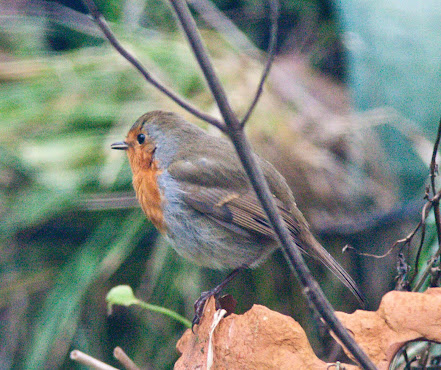Robin-a-bobbin
no more
Samuel Rogers (1763-1855)
Tread lightly
here, for here, ‘tis said,
When piping
winds are hush’d around,
A small
note wakes from underground,
Where now
his tiny bones are laid.
No more
in lone and leafless groves,
With ruffled
wing and faded breast,
His
friendless, homeless spirit roves;
Gone to
the world where birds are blest!
Where never
cat glides o’er the green,
Or school-boy’s
giant form is seen;
But Love,
and Joy, and smiling Spring
Inspire their little souls to sing!
Samuel Rogers was a celebrated poet in his lifetime, but his fame was surpassed in time by those of his friends, Wordsworth, Coleridge and Byron.
He had wished to become a Presbyterian minister and was a lifelong member of the Newington Green Unitarian congregation, one of England’s oldest Unitarian churches. His father persuaded him to follow him into banking.
On Friday evening, as we sat enjoying the warmth and the soft air from the garden, our peace was disturbed when Jellicoe shot through the open patio doors like a bat out of hell, to return with a small baby robin. He dropped it on the floor and did not growl when I picked it up, which is quite unusual. Normally, his catches are jealously guarded.The little creature was still alive and not making any noise, so I took it outside and put it safely in a plant pot, hoping that it might survive and its parents would find it.
However, it died, probably of shock, as there were no marks on its body.Robins are popularly known as Robin Redbreast, although the colour is more orange than red. Orange as a colour was not known until the 16th century when the fruit of that name was first introduced to the British Isles. The name ‘Robin’, a diminutive of Robert, was assigned to the little bird in the 15th century, at a time when giving names to familiar birds was a popular pastime. Thus we have Jenny Wren and Jack Daw among others.Male and female robins dress alike and their young are brown speckled with gold. The red breasts develop during their first moult when they are two to three months old.
Though robins are sociable and friendly to gardeners, they are fiercely territorial and chase intruders away quite aggressively. Like dunnocks and great tits, they sing nearly all year round, and will often be stimulated to sing by the light from street lamps.





Probably shock, poor robin :(
ReplyDeletePoor thing.
DeleteThese small tragedies have a special poignancy. Such an especially vulnerable time of the year for the young wildlife.
ReplyDeleteIt is poignant, but if every young one survived, we would be overwhelmed.
DeleteAll the birds around here are black, or black white and grey. It is heartening to see the bright colour on the robin's face and chest.
ReplyDeleteHe is a cheery chap.
DeleteWe had a fledgling hopping around our pots for a few days, one morning it was gone, hopefully found it's wings and flew back to safety.
ReplyDeleteThey are so vulnerable, but isn't it surprising how few dead birds we see?
DeleteI like robins but I never have the luck to see them through my lenses
ReplyDeleteThat was a sad thing to see happen. I try not to think about what goes on in the small woods around my house as there are so many cats coming and going everyday. And we have so many birds that migrate in for the summer that nest in there. It's just a fact of life.
ReplyDeleteIt is, and that's the only way to think about it.
DeleteBaby robins are beautiful tiny little things. One year we found one caught in the fruit netting (which we no longer use). I freed it and put it on the fence, where it began to make a high pitched "peep peep". We were delighted when a parent came down for it.
ReplyDeleteThey are so pretty. Isn't it good when you rescue something and it survives?
DeletePoor wee chap (or chapess). Maybe it was already not well when it fell / stumbled / came to ground. Good of Jellicoe to hand it over.
ReplyDeleteMaybe you're right, TM.
DeleteLovely poem x
ReplyDeleteAlison in Wales x
I thought so, too.
DeleteAww poor thing.
ReplyDeleteI didn't now the Samuel Rogers poem, I enjoyed reading it.
All the best Jan
I must look for more of his poems.
DeleteI love robins. When they appear here, it is a definite sign of spring! The robin is the state bird of Wisconsin. They are everywhere in spring, summer, fall....and fly south for the winter. How very sad about the baby robin, but I guess it is the circle of life.
ReplyDeleteSigns of approaching spring are always welcome. Our spring approached and just about got here, but summer is lagging behind.
DeleteLindo pajarito. Te mando un beso.
ReplyDeleteGracias!
ReplyDeleteHi Janice - life I guess ... amazing to watch - yet sad ... cheers Hilary
ReplyDeleteIt is the circle - or cycle - of life.
DeletePoor baby robin, but what a fitting tribute that poem ... xxx
ReplyDeleteSo many people find robins attractive and friendly.
Delete